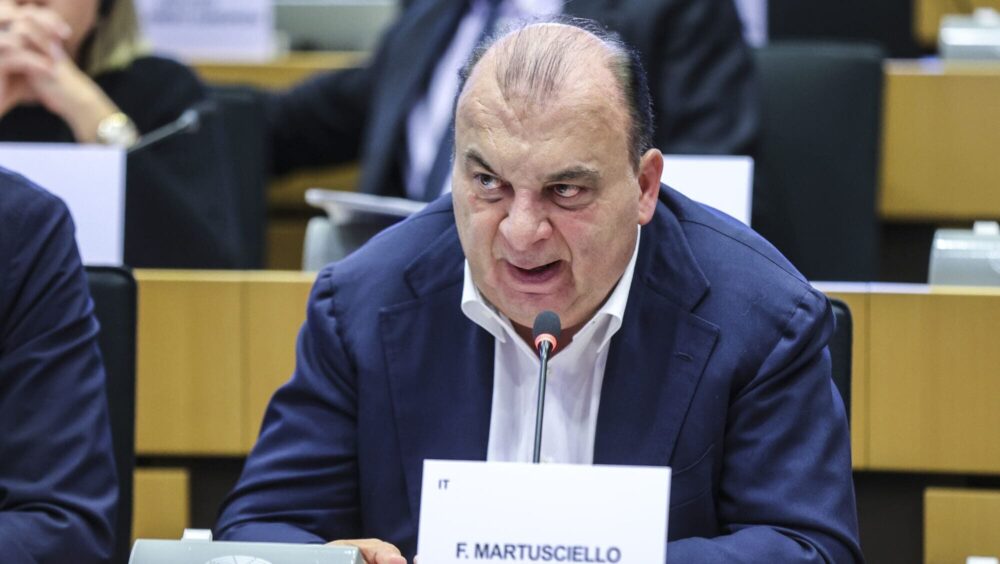
MEP Fulvio Martusciello (EPP)
European Union 2024 – Source: EP
Names are now finally emerging, some two weeks after authorities began raiding the homes and offices of lobbyists and European Union staff suspected of accepting bribes from the Chinese tech giant Huawei. While the list is still incomplete, to date it only includes members of the EPP and a few socialists, implicating the Brussels mainstream once more.
It’s only fitting that von der Leyen’s European People’s Party (EPP) gets its own high-level corruption scandal—what with the other major group in the European Parliament, the socialist S&D, taking all the heat for Qatargate a few years ago.
According to Belgian prosecutors—working alongside their Portuguese and Italian counterparts—the main suspect in the case is Valerio Ottati, a former parliamentary assistant from Italy, revealed as a lobbyist for Huawei and accused of orchestrating the bribery scheme, according to a Follow the Money exposé.
Authorities claim that Ottati used fake invoices to a Brussels-based events firm to funnel cash into Portuguese bank accounts, which were later used to pay for MEPs who co-signed a letter to the European Commission in 2021, lobbying for the inclusion of Huawei in the rollout of the EU’s 5G network. Allegedly, as much as €15,000 was promised to the letter’s author and a further €1,500 to each MEP co-signing it.
In the letter, the MEPs argued that a swift 5G roll-out is key to Europe’s “digital sovereignty.” Therefore, the Commission should not engage in any “discrimination” against companies based on their origin—a direct reference to Huawei, as it was the only major contender at risk of being excluded due to the security risks inherent in its Chinese government connection—which the MEPs called “technological racism.”
Ottati worked closely with the recently arrested Lucia Simeone, the parliamentary assistant to MEP Fulvio Martusciello (EPP), whose name appears first among the letter’s signatories and might have played a key role in enticing his colleagues to join.
Preparation of the letter was probably overseen by Ottati himself, as the police found the draft document on his laptop. The file was initially created by ‘Nuno W.M.,’ a former assistant of Martusciello, who is believed to have played the role of a middleman, responsible for disbursing the remunerations for the other co-signatories.
According to the investigators, Nuno W.M. received nearly €50,000 from Huawei through a British and a Belgian company that regularly work with the tech giant, from which he disbursed among the “author” and the signatories.
For playing his central role, Martusciello allegedly received €6,700 along with another €1,000 for his assistant, Simeone. The other co-signatories were given €11,800 collectively, while a still unknown figure identified only as “Adam M.”—presumably the “author”—was given €14,800.
Among the eight MEPs who co-signed the letter, six belong to von der Leyen’s EPP group—four Italians and two Romanians—and two to the socialist S&D group, one from each country.
#followthemoney
— Lise Witteman (@lise-witteman.bsky.social) 24 March 2025 at 18:03
[image or embed]
Martusciello, Nuno W.M., and former Romanian MEP Cristian Busoi (EPP) all denied the allegations, while the lawyer of Ottati declined to comment for now, citing the secrecy of the ongoing investigation.
Going forward, it’s worth noting that this episode about the letter is only the first chapter to become public in the wider ‘Huaweigate’ scandal. Belgian authorities previously said they were looking into at least 15 former and current MEPs who took part in a long-term corruption scheme on behalf of Huawei in the past three years, and according to his lawyer, Martusciello wasn’t even part of this initial group of suspects.
